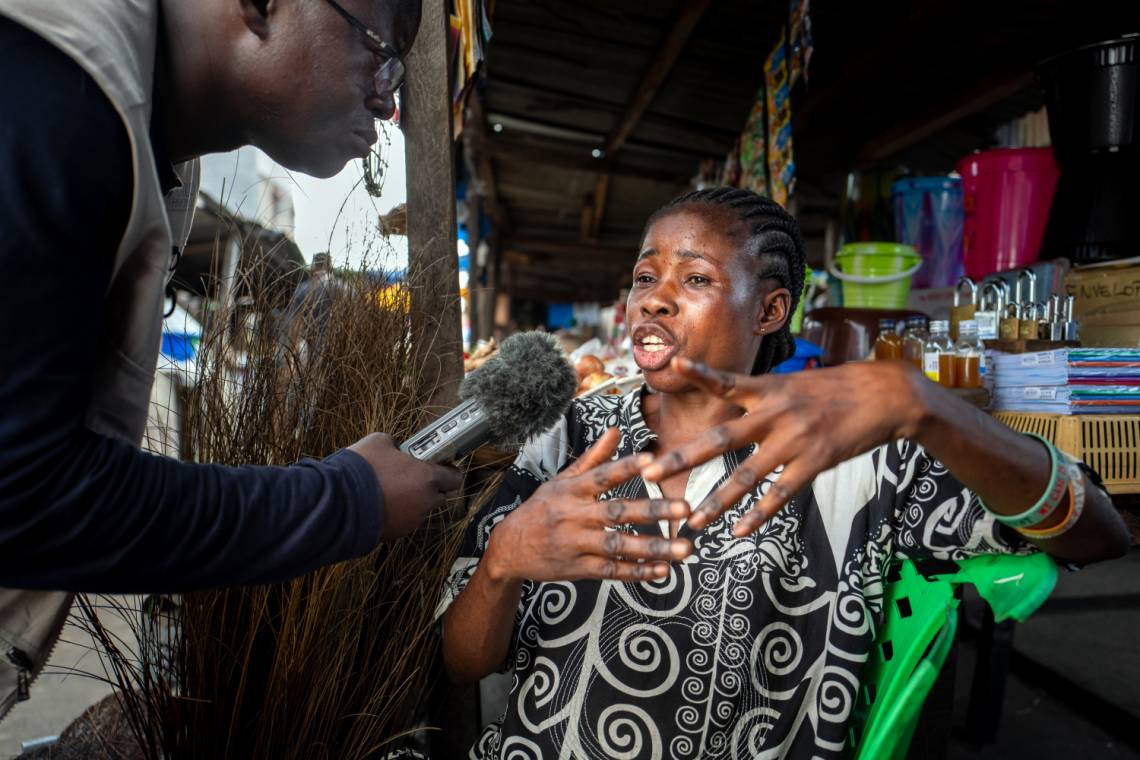Access to reliable and useful information is a vital issue in societies in crisis. Discover our actions, key figures and testimonials about our projects in our 2019 Annual Report. Excerpts below. Full report to download or read by clicking on the link above.
STAYING THE COURSE
In 2019, Fondation Hirondelle defined a new strategy for the years to come, following discussions with its employees, management, Board and partners. This strategy focuses on strengthening collaboration with our local partners, particularly for the co-production of content; on our ability to respond rapidly to humanitarian or health emergencies; and on developing our capacity to deal with global issues (environment, human rights, education, etc.).
Romaine Jean and Guillaume Pictet, respectively Board Chairperson and member, left our Board at the end of the year, and I thank them for their commitment. We now have the pleasure and honour of welcoming Tony Burgener as the new Chairman of the Board, and Isabelle Werenfels as a member.
Reflections on strategy have confirmed the relevance of the choices made by the founders 25 years ago. Independent information is necessary in crisis zones. It can make a difference, as our new programme in the Kasai region of DR Congo demonstrates. The media have a social role to play by creating links, and a mission towards young people such as Studio Sifaka in Madagascar has set itself. Finally, information and discussion programmes are a contribution to public life. Our media and partners have been doing this work all year long. They do not deviate from their mission, they stay the course.
Caroline Vuillemin
General Director, Fondation Hirondelle
FONDATION HIRONDELLE'S PROGRAMME
2017/2020 STRATEGY
In 2019, Fondation Hirondelle continued implementing its programme in the logic of the previous two years so as to achieve the three main results that we set ourselves as part of this four-year strategy. The first is to provide quality information that is useful and accessible to as many people as possible in the countries and contexts where we work. The second is to strengthen our media and media partners as responsible media organizations playing a major social role in their environment. And the third is to contribute to a better global and local consideration of the media sector, through research and studies on the effects and impact of media in crisis zones.
These results contribute to our institutional objective: "To help implement the right to information by giving the populations in the places we work access to quality media whose content is useful, non-partisan and independent, thus enabling each individual to make informed choices in his or her life, and to participate in the civic and democratic life of his or her country".
RESPONSIBLE DEVELOPMENT
The year 2019 was particularly rich in new developments. Institutionally, the Fondation’s Board welcomed a new Chairman and a new member. Three new media were launched during the year. Fondation Hirondelle has also strengthened its internal mechanisms to fight against all forms of abuse of power and abusive behaviour. Finally, we developed a new strategy for the period 2021-2024 which was submitted to our main partner, the Swiss Agency for Development and Cooperation (SDC).
The Fondation's main area of intervention, producing and broadcasting content, was expanded with the launch of Studio Yafa in Burkina Faso in March, the Ngoma Wa Kasai programme in DR Congo in June and Studio Sifaka in Madagascar in November. In the Sahel, we launched new programmes dedicated to young people in Mali and Niger. Our online media JusticeInfo.net launched a new, more user-friendly website and produced a first collection of 12 of its most important interviews.
Our second area of intervention, support to the Fondation's media partners, was marked by expansion of our partnership with Frontier Myanmar and the extension to new media partners of the Doh Athan podcast in Myanmar. Our partner radio networks in the DRC, Mali, Niger and Burkina continued to receive our technical and editorial support and to expand. We set up a new network of 6 partner radio stations in Madagascar to take Studio Sifaka's programmes.
To contribute to the sustainability of the Fondation and its media, in 2019 we focused on the sustainable integration of codes of conduct into our operations and organizational culture to prevent abuse of power, corruption and harassment, and to enable responsible and transparent management. A new strategy has also been defined, a necessary tool for 2021-2024 planning internally and externally, in order to convince new partners to work with and support us.
As part of our fourth axis of intervention dedicated to research, we co-produced with Harvard Humanitarian Initiative, British think-tank Demos and the Congolese institute ICREDES a study on the effect of social networks in the Kivus, DRC, compared with traditional media such as radio. The study on the role of local media for women's empowerment in the Sahel conducted by the Department of Journalism at the University of Sheffield has been extended to Mali and Burkina Faso after Niger, which will enable a regional vision of the issue in 2020.
KEY FIGURES 2019
11 media operations, in 10 countries, on 3 continents
11’000 hours of audio programmes (+ 5 % compared to 2018)
217 hours of video programmes (+ 3 %)
8’900 articles on the web (- 6 %)
615'860 unique visitors on our websites (+ 65 %)
285’480 followers on Facebook and Twitter (+30%)
330 media supported (+ 24 %)
558 people trained (+ 10 %)
Population covered : 87,3 Millions (+31 %)
FINANCIAL REPORT
PROJECT EXPENDITURE
FINANCIAL RESSOURCES




